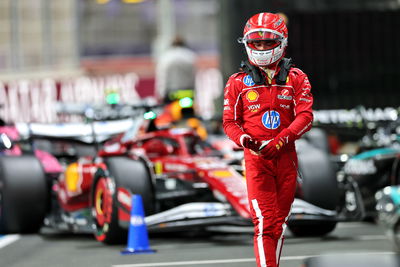Mosley confirms new threat for tobacco backing.
FIA president Max Mosley has confirmed that there is a very real threat that Formula One teams may quit the United Kingdom for foreign facilities if something is not done about the latest threat to the sport from tobacco legislation.
Following up BAR boss David Richard's plea for common sense regarding the issue, Mosley said that those British teams currently backed by tobacco - namely BAR, Jordan and McLaren - may be forced to move their operations overseas to escape a ruling that could otherwise force them to relinquish their relationship with the sponsor.
FIA president Max Mosley has confirmed that there is a very real threat that Formula One teams may quit the United Kingdom for foreign facilities if something is not done about the latest threat to the sport from tobacco legislation.
Following up BAR boss David Richard's plea for common sense regarding the issue, Mosley said that those British teams currently backed by tobacco - namely BAR, Jordan and McLaren - may be forced to move their operations overseas to escape a ruling that could otherwise force them to relinquish their relationship with the sponsor.
Although the FIA and Formula One have agreed to a complete cessation of tobacco sponsorship from 2006, the European Union pulled a flanker by bringing forward its deadline for a similar situation to July next year. Many member states have already opposed the move, but the UK has agreed to fall into line, effectively making it illegal for British teams carrying tobacco sponsorship to display logos and names anywhere in the world.
Richards raised the issue at BAR's 2004 launch on Sunday, claiming that he may be forced to move the team out of Britain if it was to continue to operate. Japan, the home of engine supplier Honda, was mooted as one possible destination.
"It is a major concern to me - and should be to everyone in F1 - because the knock-on effects will be significant," he told Britain's Daily Telegraph newspaper, "Because we are a British team with British sponsors, it is my understanding that, wherever we compete in the world, we would not be able to run tobacco sponsorship on the cars. Yet foreign teams, with foreign sponsors, can. It is a disaster in the making."
Richards went on to explain that, by adhering to the original EU deadline of 2006, BAR had formulated a three-year plan to replace its tobacco sponsorship, but this was now in danger of coming up short unless something was done to find a way of exempting the sport from the new ruling.
"Ideally, the future of BAR would be decided between me and Honda, and that would keep the team in the United Kingdom," he said, "But if [British American Tobacco] are not given reasonable time to work with me to find alternatives, the whole thing would go to Japan within a year."
Mosley has confirmed that the threat is a credible one and, allied to other recent legislation concerning the European Arrest Warrant and labour laws that would restrict employees to a 35-hour week, could seriously damage one of Britain's growth industries. Unless a compromise could be reached between the British government and the EU over each issue, he said, motorsport business would gradually join the 'brain drain' in moving overseas.
"If you are using cutting-edge technology, you need to be in an appropriate environment," he told the Telegraph, "The combination of the arrest warrant, the 35-hour working week and other tiresome legislation ought to make you wonder if this is indeed the right environment."
"Twenty years ago, it would have been impossible [to take racing business abroad], and, ten years ago, [it would have been] unlikely," he continued, "But now it would be relatively straightforward for the teams to decamp. There are countries [abroad] with the capacity and a skilled labour force that you imagine would be able to offer everything they need to move.
"It just needs someone to make an offer and talk to Bernie [Ecclestone], and I'm sure he could talk the teams into it."











